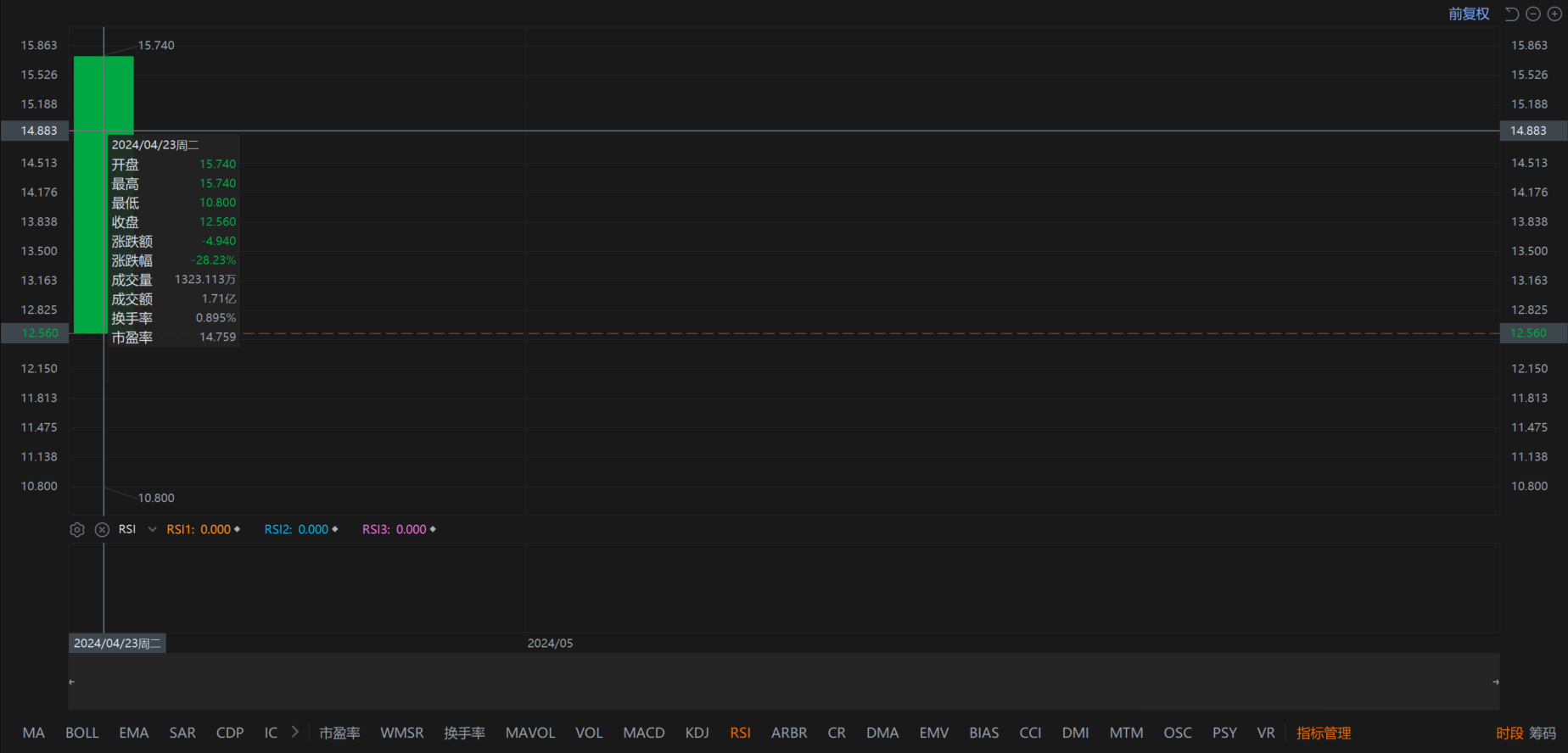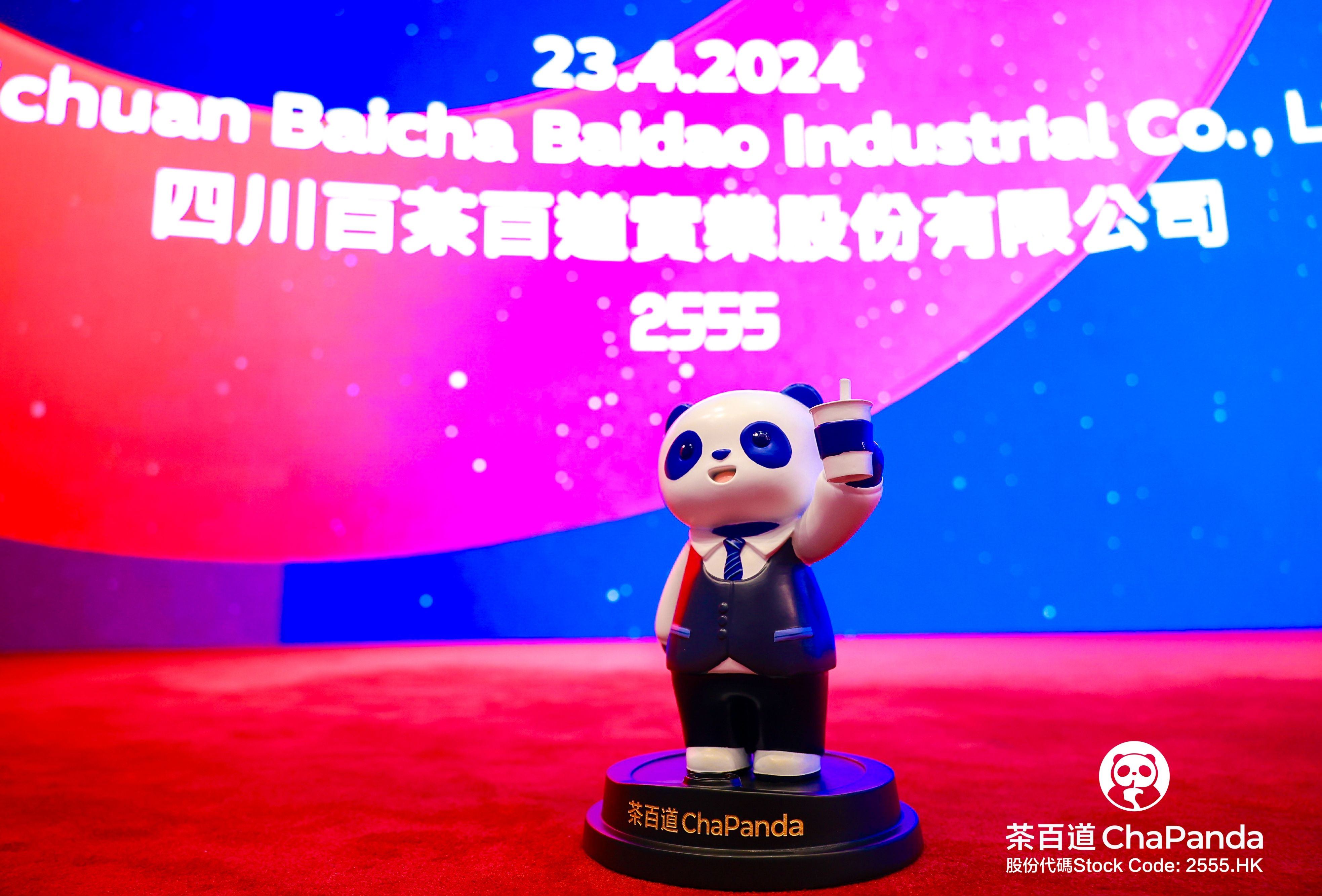Chabai Dao's stock plunged over 36% on its first day of listing, with significant concerns about the "land sale" model
The stock price collapse of Chabai Dao was not without signs. According to data from AIPO, the company's stock price fell by 13.71% in the dark market the day before, with the maximum drop reaching 15.43%.
On April 23, the well-known new-style tea beverage brand "Chabai Dao" saw its parent company, Sichuan Baicha Baido Industrial Co., Ltd., officially ring the opening bell on the Main Board of the Hong Kong Stock Exchange (HKEX). This marked Chabai Dao as the first "franchise-based tea beverage stock" in the history of the HKEX and also represented the largest IPO of the year 2024 so far.
The ideal is beautiful, but the reality is cruel. After the opening of the Hong Kong stock market, Chabai Dao immediately broke its issue price, with the drop reaching over 36% at one point. The decline narrowed slightly in the afternoon. By the time of publishing, Chabai Dao had fallen by 28.23%, trading at 12.56 HKD per share, with a trading volume of 13.23 million and a turnover of 171 million HKD, resulting in a turnover rate of 0.895%. Based on the IPO price of 17.5 HKD per share and a calculation of 200 shares per hand, this means that retail investors are currently at least 988 HKD in the red for each hand they subscribed to.

The stock price collapse of Chabai Dao was not without signs. According to data from AIPO, the company's stock price fell by 13.71% in the dark market the day before, with the maximum drop reaching 15.43%, reflecting investors' lack of confidence in the current stock price even before the official listing. Moreover, the market's enthusiasm for subscribing to Chabai Dao's new shares was not high, and there was even an undersubscription. According to the prospectus, the allotment rate for Chabai Dao's stock was 100%, which means that retail investors who subscribed to the new shares would receive an allocation.
The prospectus shows that Chabai Dao is a brand that combines traditional Chinese tea culture with modern innovation. The first Chabai Dao store was established in Chengdu in 2008. From 2021 to 2023, the company's revenue was 3.64 billion, 4.23 billion, and 5.7 billion yuan, respectively, with a compound annual growth rate (CAGR) of 25.1%. The gross profit was 1.30 billion, 1.46 billion, and 1.96 billion yuan, respectively, with a CAGR of 22.9%. The adjusted net profit for Chabai Dao from 2021 to 2023 was 900 million, 970 million, and 1.26 billion yuan, with a net profit CAGR of 18.2%, and an adjusted net profit rate of 22% in 2023.
In 2018, Chabai Dao officially opened up for national franchising and embarked on a path of rapid expansion. In 2019, the number of Chabai Dao stores just exceeded 500, and by 2021, this number had increased tenfold, breaking through 5,000 stores, achieving a tenfold increase in just two years. As of February 18, 2024, Chabai Dao had a total of 7,927 stores in China, covering 31 provinces and cities, achieving full coverage of all provinces and cities in China.
It is worth noting that the main source of revenue for Chabai Dao is not the direct collection of brand use fees and franchise fees from franchisees, but the fees collected from selling goods and equipment to franchisees. The former accounts for about 4% of total revenue, while the latter accounts for 96%.
Under this "land sale" model, issues such as food safety concerns, poor cost control, and excessively high supply chain prices for Chabai Dao have gradually emerged. While other tea companies can hold 100% of the core beverage ingredients in their own hands, Chabai Dao still needs to purchase raw materials from other suppliers, which is not conducive to controlling upstream resources. As a result, the average retail sales per transaction for Chabai Dao have decreased from 28.9 yuan in 2021 to 27.4 yuan in 2023, the average sales volume per store has dropped from 163,100 cups to 143,500 cups, and the average retail sales per store have also decreased from 2.7282 million yuan to 2.388 million yuan.
Additionally, the Chinese freshly-made tea beverage market has become increasingly competitive in recent years, and the "new-style tea beverage" track has become more crowded. According to a report by Frost & Sullivan, calculated by retail sales in 2023, Chabai Dao ranked third in the Chinese freshly-made tea beverage store market, with a market share of 6.8%. The market size of the Chinese freshly-made tea beverage industry has grown from 80.5 billion yuan in 2018 to 247.3 billion yuan in 2023, with a compound annual growth rate (CAGR) of 25.2%, and it is expected to continue to grow at a CAGR of 15.4% to 538.5 billion yuan by 2028.
As the tea beverage market becomes increasingly saturated, Chabai Dao has begun to focus on a "going down-market + going overseas" strategy to seize the blue ocean space.
By the end of 2023, the proportion of Chabai Dao stores in first-tier, new first-tier, second-tier, third-tier, fourth-tier, and below cities was 10.6%, 26.9%, 20.9%, 19.4%, and 22.2%, respectively. Chabai Dao believes in its prospectus that there is a significant market space in lower-tier cities, and therefore plans to further densify stores in second-tier and below cities to capture the sinking market.
In terms of overseas markets, since the official opening in January of this year, the performance of Chabai Dao's first branch in South Korea has exceeded expectations. On the 19th of this month, the second branch of Chabai Dao in South Korea, located in the Apgujeong Galleria Department Store, officially opened. Potential overseas markets also include Thailand, Vietnam, Malaysia, Australia, and others.
The prospectus also points out that about 51% of the net proceeds from this offering will be used to improve overall operational capabilities and strengthen the supply chain; about 20% will be used to develop digital capabilities, as well as to recruit and train professional talent. The remaining funds will be used for brand building and promotion activities, promoting the self-operated coffee brand, laying out a coffee shop network in China, product development, and innovation, among others.

·Original
Disclaimer: The views in this article are from the original Creator and do not represent the views or position of Hawk Insight. The content of the article is for reference, communication and learning only, and does not constitute investment advice. If it involves copyright issues, please contact us for deletion.